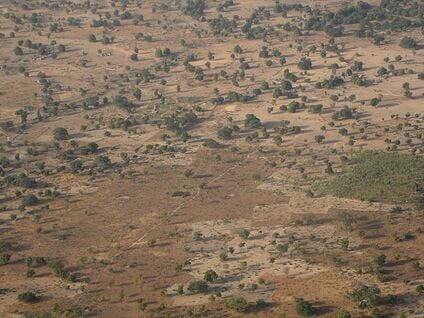(→Food activism: Yacouba Sawadogo) |
|||
| Line 13: | Line 13: | ||
[[Wikia:solarcooking:Burkina Faso|Solar cooking resources in Burkina Faso]] | [[Wikia:solarcooking:Burkina Faso|Solar cooking resources in Burkina Faso]] | ||
==== Yacouba Sawadogo ==== | |||
Yacouba Sawadogo is a farmer from the west African nation of Burkina Faso who has been successfully using a traditional farming technique called Zaï to restore soils damaged by desertification and drought. A documentary feature film The Man Who Stopped the Desert (2010) first screened in the UK portrays his life. | |||
Zaï holes: Zaï holes are holes dug in the soil. Traditionally they were used in a limited way to restore barren land. Yacouba Sawadogo introduced the innovation of filling them with manure and other biodegradable waste, in order to provide a source of nutrients for plant life. The manure attracts termites, whose tunnels help break up the soil further. He also increased the size of the holes slightly over the traditional models. Zaï holes have been used to help cultivate trees, sorghum, and millet. | |||
Outreach: To promote these methods, particularly zaï holes, Yacouba Sawadogo holds bi-yearly "Market Days" at his farm in the village of Gourga. Attendees from over a hundred regional villages come to share seed samples, swap tips, and learn from one another. {{W|Yacouba Sawadogo}} | |||
==== Food security ==== | ==== Food security ==== | ||
Revision as of 11:58, 8 February 2016
Initiatives by topic
Biodiversity
Burkina Faso is largely wild bush country with a mixture of grass and small trees in varying proportions. The savanna region is mainly grassland in the rainy season and semi desert during the harmattan period (defined as the period when stormy and dusty Sahara winds blow dry and hot). Fauna, one of the most diverse in West Africa, includes the elephant, hippopotamus, buffalo, monkey, lions, crocodile, giraffe, various types of antelope, and a vast variety of bird and insect life.
To ensure conservation and preservation of the wildlife of Burkina Faso, four national parks have been established. These are the Po National Park in the south-centre of the country, Arli National Park established in 1954 in the southeast, W of the Niger National Park, a trans frontier park existing since 1957 in the east bordering Benin and Niger and the Deux Balés National Park. The forests, fauna and fish have been declared part of the national estate of Burkina Faso. In addition, the List of national parks of Burkina Faso consist of one UNESCO Biosphere reserve, three Complete Reserves, six Partial Reserves and ten protected forests. However, according to conservation classification conducted between 1936 and 1957, the country has 78 protected areas that cover 38,369 km2 (14,814 sq mi), which accounts to about 14% of the area of the country. W
Food activism
Solar cooking resources in Burkina Faso
Yacouba Sawadogo
Yacouba Sawadogo is a farmer from the west African nation of Burkina Faso who has been successfully using a traditional farming technique called Zaï to restore soils damaged by desertification and drought. A documentary feature film The Man Who Stopped the Desert (2010) first screened in the UK portrays his life.
Zaï holes: Zaï holes are holes dug in the soil. Traditionally they were used in a limited way to restore barren land. Yacouba Sawadogo introduced the innovation of filling them with manure and other biodegradable waste, in order to provide a source of nutrients for plant life. The manure attracts termites, whose tunnels help break up the soil further. He also increased the size of the holes slightly over the traditional models. Zaï holes have been used to help cultivate trees, sorghum, and millet.
Outreach: To promote these methods, particularly zaï holes, Yacouba Sawadogo holds bi-yearly "Market Days" at his farm in the village of Gourga. Attendees from over a hundred regional villages come to share seed samples, swap tips, and learn from one another. W
Food security
Burkina Faso is faced with high levels of food insecurity, which links with poverty and challenging climatic variation, ranging from severe flooding to extreme drought. High rates of food insecurity are particularly prevalent in rural populations. The World Food Programme has several projects it is working on that are geared towards increasing food security in Burkina Faso. W
Interwiki links
Wikipedia: Burkina Faso, Wildlife of Burkina Faso, Yacouba Sawadogo
References Template:Attrib sca ref
